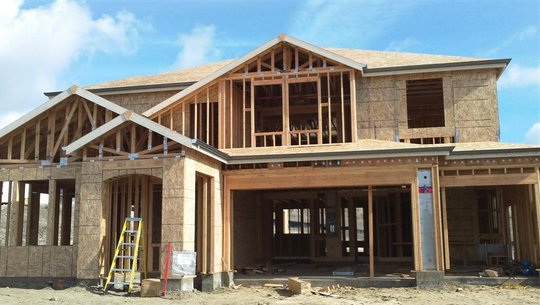
A Durham company is trying to disrupt the construction industry – one robot at a time.
BotBuilt, cofounded by serial entrepreneur Brent Wadas, is here to change the sector completely through automation.
“We’re going to be dangerous,” Wadas said. “It’s game on.”
By automating the framing process when it comes to building houses, Wadas and team say they are cutting costs – and helping builders operate through an ongoing labor shortage that has delayed countless projects.
“They’re desperate to find workers,” said co-founder Colin Devine, referring to homebuilders. “So we’re riding that wave … and adding our advance software and our robots.”
BotBuilt was cofounded by CEO Wadas, CTO Barrett Ames and COO Devine. Today, the company has 12 full-time employees and two facilities – its main operation in Durham and a nearby production facility.
Ames had “frequently” tried to pitch his cousin, Wadas, on startup ideas surrounding robots. The ideas varied, such as the food startup concept that involved robots flipping hamburgers.
Wadas, a veteran, was working with the Joint Special Operations Command at Fort Bragg at the time that idea was introduced.
“I’m part of the national mission at JSOC right now and you want me to live that life and leave it to change the way America flips burgers?” he remembers thinking.
But then Ames came up with an idea that touched an emotional trigger – a way to tackle affordable housing with robots.
And it clicked.
So in 2020, the fledgling team put together a business plan. With some new robots – and including some robotic arms purchased on eBay – the team got to work on custom tooling and software. They bought the robotic arms used in major manufacturing plants – reprogramming them to work with their own technology.
The result? Framing packages for homes.
Walls – from studs to top and bottom plates – are typically produced on the job site by humans.
“They’ll take them, measure out what’s needed and nail them together,” Wadas said.
But builders are typically guessing at how much lumber they’ll need at the job site.
“And you’re depending on day laborers to do the cuts and measurements,” he said, pointing to the “gigantic trash bins” sitting outside of construction sites full of wood as evidence that it’s not an exact science. It typically takes between two to three weeks “just to frame a house.”
“40 percent of your time and cost suck comes from the framing process,” Wadas said.
BotBuilt’s process cuts the cost suck, he said. The firm takes a basic PDF from the architect and runs it through its system. The robots cut the wood.
“You are not buying a single board more than you need to,” Wadas said.
The resulting panels are shipped to the job site and can go up in just a few hours.
BotBuilt, an alum of the 2021 YCombinator program, works with homebuilders – who benefit from the cost savings, but also from automation, as the construction labor pool has tightened in recent years.